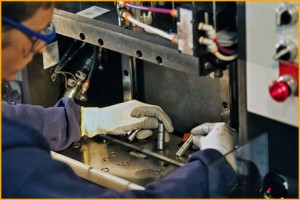The smart manufacturing/high technology (SMHT) sector is New Hampshire’s economic engine, bringing more wealth into New Hampshire than any other sector-including tourism and retail-according to a recent New Hampshire Center for Public Policy Studies report sponsored by the Business and Industry Association of New Hampshire (BIA), in collaboration with the New Hampshire High Technology Council (NHHTC) and several BIA members. Results of the study also show that New Hampshire’s business costs are high relative to other states and countries with which the state competes for SMHT companies and employment.
According to the center’s study, in 2009 the SMHT sector, which includes 3,700 companies in New Hampshire employing almost 80,000 people, paid out $6.4 billion in wages and benefits, making it the largest single sector of New Hampshire’s economy (19 percent). The next largest sector is government and government enterprises (15 percent), followed by healthcare and social assistance (14 percent).
 “As important as other sectors are, there is no question that the smart manufacturing/high technology sector drives New Hampshire’s economy and is absolutely critical to the state’s long-term economic prosperity,” said BIA President Jim Roche. “SMHT companies generate more wealth for New Hampshire, pay more in compensation to employees, export more and pay more in state taxes than any other sector.”
“As important as other sectors are, there is no question that the smart manufacturing/high technology sector drives New Hampshire’s economy and is absolutely critical to the state’s long-term economic prosperity,” said BIA President Jim Roche. “SMHT companies generate more wealth for New Hampshire, pay more in compensation to employees, export more and pay more in state taxes than any other sector.”
Economic Impact
SMHT is defined as manufacturers engaged in the transformation of materials into new products using advanced technology and skilled labor, as well as high technology companies engaged in software publishing, computer systems design and scientific research.
Paying an average wage of $1,200 per week, which is 40 percent higher than the average weekly wage for all private sector employees working in New Hampshire, SMHT companies account for 9 percent of New Hampshire’s private sector employers, but they employ more than 15 percent of New Hampshire’s private sector workers.
According to the report’s author, Dennis Delay, an economist with the center, SMHT employers are an important source of high-wage jobs for New Hampshire workers. “The average compensation per SMHT employee has exceeded average wages and benefits paid in every other industry sector, including construction, healthcare, education, retail trade and even financial services. This is important to note because it demonstrates that New Hampshire’s affluence, high standard of living and quality of life are in large part attributable to the state’s SMHT sector.”
Exports Generate Wealth
Manufacturing is New Hampshire’s most important export industry. Exports from the state’s manufacturers directly support more than 77,000 jobs, compared to about 52,000 jobs in travel and tourism. New Hampshire imports four times as much wealth from in-state manufacturing facilities as from tourism – manufacturing supports $18.5 billion in GSP while tourism supports $4.2 billion. Notably, in FY2008 manufacturing companies represented 8 percent of the companies paying business profits and business enterprise taxes; however, those same companies accounted for 23 percent of total business tax revenue.
The Value of an SMHT Job
Economic modeling shows that for every 100 new manufacturing jobs, the state would see an additional 138 indirect and induced jobs, which would generate $11 million in earnings, $18 million in gross domestic product, and $1.2 million in state and local tax revenue. Compare this to healthcare (55 indirect and induced jobs per 100 new jobs) and tourism (32 indirect and induced per 100 new jobs) and one can see the value of investing in New Hampshire’s SMHT sector.
New Hampshire High Technology Council President Fred Kocher agrees. “One of the most important findings in our study is that SMHT employers are the largest source of high-wage jobs for New Hampshire. That one fact has implications for the public policies we enact, the workforce development we undertake, the education we promote and the collaborations we forge on job-related issues facing the SMHT sector. The state’s economic health depends on it.”
Competitiveness and the Future of SMHT in New Hampshire
The center’s study also compared New Hampshire’s cost of doing business relative to top competitor states and countries, including Virginia, North Carolina, South Carolina, Texas, Mexico, India, China and Malaysia. Among the findings:
Wages in New Hampshire are slightly higher than in competitor states and dramatically higher than in competitor countries
Healthcare costs are higher in New Hampshire than in most states and 10 times higher than in the nearest competitor country
Electric rates in New Hampshire are almost twice as high as in competitor states and about even with Mexico and China
New Hampshire’s corporate income tax rate is highest among the state’s competitors and highest compared to competitor countries when the U.S. corporate tax rate is included
BIA and NHHTC Recommendations for Promoting SMHT in New Hampshire
As a companion to the study, the BIA and NHHTC released a set of recommendations to policy makers to promote smart manufacturing/high technology growth in New Hampshire. Roche of the BIA and Kocher of the NHHTC feel that the future of New Hampshire’s SMHT sector depends upon policy makers’ willingness to embrace policies and initiatives that will spur growth and innovation in this economic sector.
Among BIA and NHHTC recommendations are:
Work to lower healthcare costs by opposing new or expanded healthcare benefit mandates and supporting adequate Medicaid reimbursements to healthcare providers
Lower the business profits and business enterprise taxes, increase the R&D tax credit, improve net operating loss and BET credit carry-forward provisions, and adopt single sales factor BPT apportionment
Improve New Hampshire’s labor and environmental regulatory environment
Work to lower energy costs by supporting policies that promote energy efficiency, preserve dedicated funds for business energy needs, leverage regional strengths and help ratepayers access competitive supply options
Support policies and initiatives aimed at developing and maintaining an educated, skilled workforce in New Hampshire and that ensure businesses have access to talent and resources
“We realize these recommendations will not be embraced or implemented by lawmakers overnight, especially given the state’s dire fiscal condition,” said Roche. “Nonetheless, we believe these are attainable goals-goals we will be working toward for the next several years.”
The complete SMHT study may be viewed on the New Hampshire Center for Public Policy Studies’ Web site at http://www.nhpolicy.org/reports/smrtmfgfinal.pdf. The recommendations to legislators for promoting SMHT growth in New Hampshire may be viewed on the BIA’s Web site at http://bianhassoc.weblinkconnect.com/cwt/external/wcpages/newsroom/SMHT_Report.aspx.











 Further, while Smart Manufacturing/High Technology (SMHT) companies represent eight percent of the companies paying the state’s Business Profits and Business Enterprise taxes, those same companies accounted for 23 percent of the total business tax revenue in FY2008, the highest of any industrial sector.
Further, while Smart Manufacturing/High Technology (SMHT) companies represent eight percent of the companies paying the state’s Business Profits and Business Enterprise taxes, those same companies accounted for 23 percent of the total business tax revenue in FY2008, the highest of any industrial sector. “As important as other sectors are, there is no question that the smart manufacturing/high technology sector drives New Hampshire’s economy and is absolutely critical to the state’s long-term economic prosperity,” said BIA President Jim Roche. “SMHT companies generate more wealth for New Hampshire, pay more in compensation to employees, export more and pay more in state taxes than any other sector.”
“As important as other sectors are, there is no question that the smart manufacturing/high technology sector drives New Hampshire’s economy and is absolutely critical to the state’s long-term economic prosperity,” said BIA President Jim Roche. “SMHT companies generate more wealth for New Hampshire, pay more in compensation to employees, export more and pay more in state taxes than any other sector.”  Far fetched? Not at all, especially when you consider how the working contract has changed for the professional worker over time. This month’s “Tomorrow’s Business Advice Today” column by Dr. Russ Ouellette examines that contract and discusses what happens when visionary thinkers like Dr. Elyse Barry of Sojourn Partners, Network for Work Co-Founders Tammy Hildreth and Paul Philbrick and NH Center for Public Policy Studies Economist Dennis Delay join together in a roundtable setting to discuss workforce development issues and the shift in the employer/employee dynamic.
Far fetched? Not at all, especially when you consider how the working contract has changed for the professional worker over time. This month’s “Tomorrow’s Business Advice Today” column by Dr. Russ Ouellette examines that contract and discusses what happens when visionary thinkers like Dr. Elyse Barry of Sojourn Partners, Network for Work Co-Founders Tammy Hildreth and Paul Philbrick and NH Center for Public Policy Studies Economist Dennis Delay join together in a roundtable setting to discuss workforce development issues and the shift in the employer/employee dynamic.